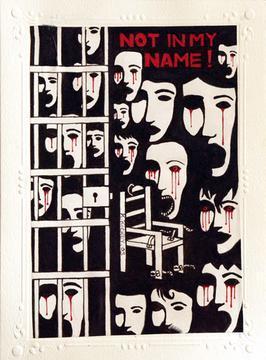Monday, 2 June 2008
Death penalty: 2008 'banner' year?
While capital punishment opponents still hope to find a way to ban it,
death by lethal injection could be in more frequent use in Mississippi.
After the state's execution of Earl Wesley Berry on May 21, Attorney
General Jim Hood and Corrections Commissioner Chris Epps said Mississippi
could executive three more inmates during 2008. One of those could come by
the end of the summer, according to The Associated Press.
Last month, when the nation's highest court upheld lethal injection,
Berry's execution was allowed to be rescheduled. He had been set to die
Oct. 30, 2007, but the court stayed it with only 19 minutes to go. The
deliberation over the constitutionality of lethal injection in a Kentucky
case stopped executions nationwide.
After 7 months, Berry became the second person in the United States to be
executed following the U.S. Supreme Court decision. He also became the 5th
Mississippi death-row inmate to die by lethal injection.
Berry's execution went smoothly and by the book, Epps said. The high court
denied appeals by Berry's attorneys that he should have been spared
because he was mentally retarded and that Mississippi's lethal injection
process is unconstitutionally cruel.
Some of the 35 states that use lethal injection will be carrying out their
death sentences now, too.
For families of victims, like those of Berry's victim, the cost of
awaiting closure is high. Berry confessed to abducting Mary Bounds back in
1987 as she left church choir practice in Houston, then beating her to
death and dumping her body on a rural road.
Following the execution, Bounds' widower, Charles Bounds, said: "I just
think it took too long. I have had this on my mind for 20 years."
Though Berry had confessed, Epps said he never expressed remorse for the
crime.
There are plenty more awaiting appeals where Berry came from: 64 inmates
remain on Mississippi's death row - 3 women, 61 men, the AP reports. 31
are white, 32 black and 1 is Asian. The youngest is Terry Pitchford, 21,
convicted in Grenada County; the oldest, Gerald James Holland, 70,
convicted in Harrison County. The longest-serving death row inmate,
Richard Jordan, 61, was convicted in Jackson County 30 years ago.
Mississippi's last previous execution was Oct. 18, 2006, when Bobby Glen
Wilcher was put to death.
Some might say it's a crass way of looking at it, but for the state's
taxpayers, executions are cost efficient.
Epps said it costs $14,000 to execute an inmate, including staff overtime
and preparing the death chamber at the Mississippi State Penitentiary at
Parchman. By contrast, he said, it costs more than $350,000 to incarcerate
Berry for 20 years.
With this impediment to imposition of the ultimate penalty, the death row
numbers could start to shift.
Let justice be done.
(source: Jackson Clarion-Ledger)
Subscribe to:
Post Comments (Atom)


No comments:
Post a Comment